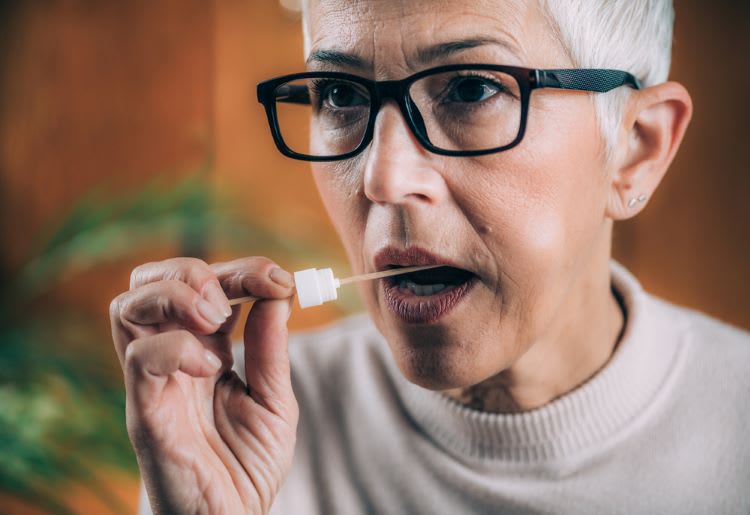Insomnia is one of the leading causes of sleeplessness. And staying up at night or taking 2-3 hours to fall asleep can be frustrating. Thankfully, special routines and medications can help you manage insomnia to improve sleep quality.
If we can understand the genetic traits related to this condition, it'll be easier to treat or manage it. Can insomnia be inherited? Is it in our genes? Genetic testing allows us to probe into the essence of a cell to find our answers.
This article discusses how genetic testing can help diagnose the cause of sleeplessness, if it's heritable and how to prevent it from worsening down the family tree.
» Looking to explore your DNA at home? Check out our top picks for the best DNA testing kits.
Are Sleep Disorders Genetic?
Recent studies show a link between sleep disorders and genetics. In fact, some sleep disorders are hereditary in both men and women. But this topic still needs to be studied in depth. Until then, it’s best to say that not all sleeping disorders are caused by genetics.
The fact that parents can pass this disorder to their children explains how genetics affect health. Genetic markers exist for disorders like fatal familial insomnia (FFI), familial advanced sleep phase syndrome (FASP), chronic primary insomnia, and narcolepsy, with cataplexy evident in genes and heredity.
Aside from genetics, other causes of sleeping disorders include:
- environmental factors such as alcohol, noise, and bright light
- physical factors such as pain, ulcers, and urination
- psychiatric factors like depression, post-traumatic stress, and anxiety disorders
- working night shifts which may alter your body's natural clock
- medications like ACE inhibitors, Alpha- and Beta-blockers, and corticosteroids

Can Genetic Tests Tell If You Have a Sleep Disorder?
Genetic testing for diseases became popular in the early 2000s and emerged as a go-to option for predicting the chances of getting certain conditions.
These tests help measure risks for cancer, obesity, psoriasis, and Parkinson's disease. It reveals genetic biomarkers related to a disease, measures the disease risks, and provides information to help draft a lifestyle plan.
You can also genetically test for sleeping disorders, especially if you have a family member diagnosed with one.
DNA testing for genetic disorders tests the variants of the BTBD9 and ADA genes associated with lack of sleep. Other genes monitored during this test are the CLOCK gene (a gene that regulates the circadian rhythm) and the AANAT gene.
Here's a list of sleeping disorders that can be measured using a DNA test:
- sleep apnea
- restless leg syndrome
- narcolepsy
- insomnia
- short sleep syndrome
» Not sure how to interpret your DNA results? Use these tips to make sense of your test report.

3 Best Genetic Tests for Sleep Disorders
Genetic tests come in three forms: medically necessary DNA tests, ancestry tests, and at-home DNA tests.
At-home tests reveal the state of your health and are very effective in predicting an individual's risk for a particular disease. Sleeping disorders are no exception.
All you need is to choose the right DNA test kit, submit your saliva or blood sample—whichever is required—and you're good to go. Your results come back with a detailed analysis of your sample and show whether or not you're at risk for a particular sleeping disorder.
Let's have a look at some of the best blood and DNA tests for disorders:
1. LetsGetChecked

LetsGetChecked is an at-home DNA test that checks for various diseases or underlying conditions in your body.
Unlike other genetic tests that check your DNA for markers, LetsGetChecked is best for testing health-related issues and other conditions by focusing on your blood.
For example, LetsGetChecked has a series of home wellness tests that check your cardiovascular and metabolic health, which may face increased risks due to a sleep disorder. You may also want to check health-related issues that may trigger anxiety and depression, which are some of the leading causes of sleeping disorders.
2. Futura Genetics

Futura Genetics takes it a step further. It is an advanced genetic test best for testing your possibility of contracting over 28 common diseases.
Futura Genetics applies some of the best genetic sequencing techniques to analyze your genes and tendency to develop a particular disorder. Future Genetics can also help reduce the risk of developing an inherited condition.
Although it only tests for 28 common conditions, Futura Genetics is very suitable for checking underlying conditions related to a sleeping disorder.
3. 23andMe

23andMe is best for taking wellness tests, ancestry tests, and at-home DNA tests.
Alongside tracing your genetic heritage, 23andMe also allows you to gain insights into heritable diseases in your family history. By having this information, you can improve your lifestyle and eating habits.
Additionally, 23andMe helps to determine the probability of developing a particular disorder by extensively analyzing your genetic information.
23andMe has a premium membership plan that lets you understand how your body responds to medications and gives you detailed information about your ancestors. The plan also has a unique feature that determines the possibility of developing sleep disorders like insomnia and sleep apnea.
The best part? It provides these services at a starting price of $79, which makes it one of the cheapest DNA tests available.
» You need to read this before taking an at-home DNA test.

Bottom Line: Most Sleep Disorders Are Genetic
While not all sleeping disorders are caused by genetics, taking an at-home DNA test can show you if you're predisposed to the most common sleeping disorders, such as insomnia, narcolepsy, and sleep apnea.
If you have a diagnosed family member, it's also ideal to know what DNA tests say about your nutrition. This information will help you decide which lifestyle and eating habits are best for you.
You may also need to see your doctor for recommendations on improving your sleep quality.
» Not sure where to start? Try our top DNA test tips for genetic genealogy beginners.

